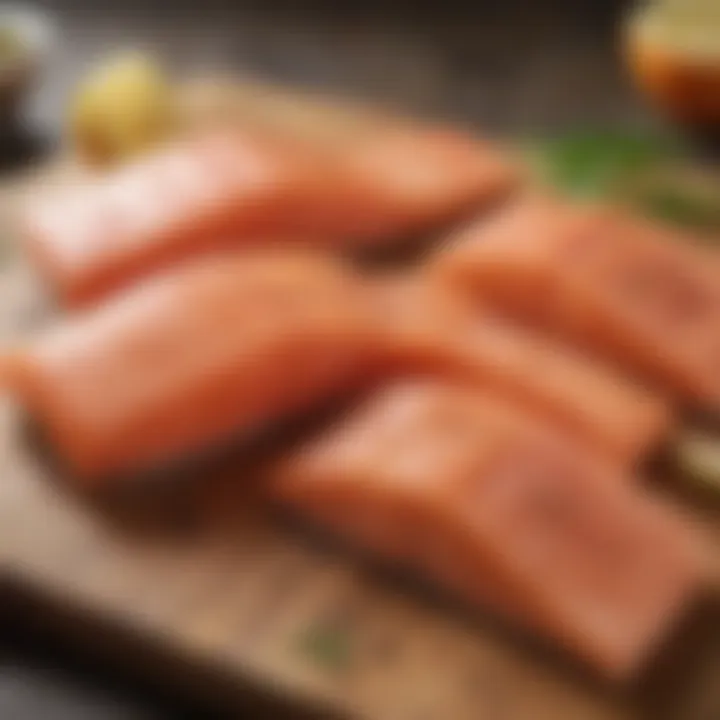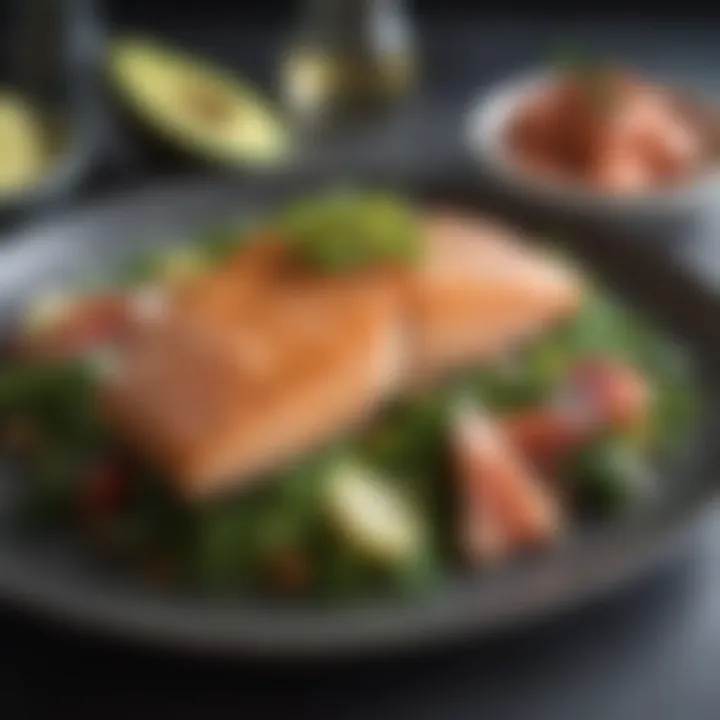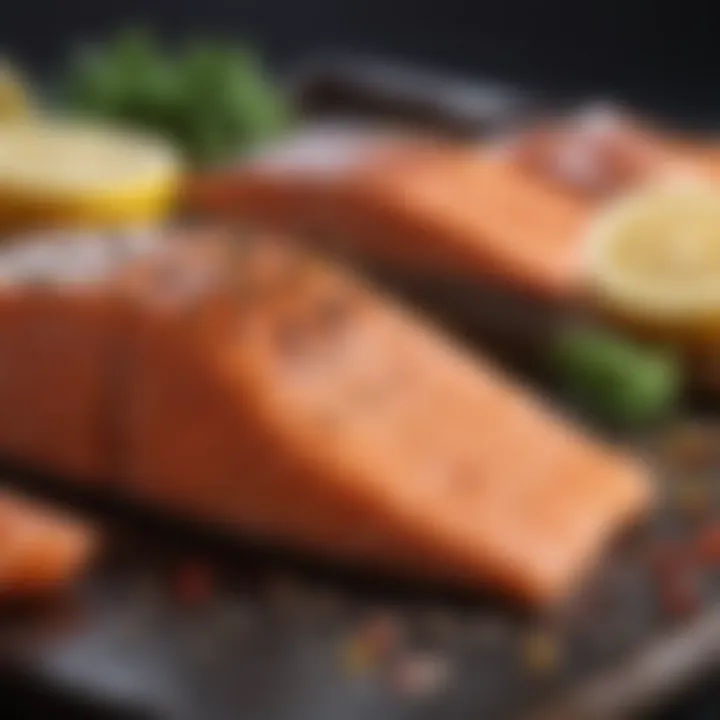Understanding Salmon Carbs in the Keto Diet


Intro
The ketogenic diet is known for its emphasis on high-fat and low-carbohydrate foods. Within this context, salmon emerges as a particularly valuable source of nutrition. Not only does it provide essential fatty acids, but it also brings forward complexities related to its carbohydrate content. Understanding these aspects becomes crucial when considering salmon for a keto meal plan. This article will delve into salmon’s nutritional profile, offering insight into its compatibility with the keto approach. We will further explore practical meal ideas and methods of preparation that allow individuals to enjoy this nutrient-dense fish while adhering to the principles of the ketogenic diet.
Recipe Overview
Recipe Name
Lemon Garlic Butter Salmon
Cuisine Type
Mediterranean
This simple yet elegant dish showcases salmon’s versatility and aligns with keto principles. The use of lemon and garlic enhances flavors without overwhelming the delicate taste of the fish. Moreover, the combination of ingredients is low in carbs, making it an ideal choice for those following a ketogenic lifestyle.
Ingredients
- 2 salmon fillets (about 6 ounces each)
- 2 tablespoons unsalted butter
- 2 cloves garlic, minced
- Juice of 1 lemon
- Salt and pepper to taste
- Fresh parsley for garnishing
Substitutions for Common Ingredients
- Instead of unsalted butter, one can use ghee for a dairy-free option.
- Lemon juice can be replaced with lime juice for a different flavor profile.
- Fresh herbs like dill or basil can substitute for parsley, depending on personal preference.
Salmon and Its Nutritional Profile
Salmon is often celebrated for its rich nutritional profile, making it a key player in the discussion of healthy eating, particularly within the context of the ketogenic diet. Understanding its nutritional value is essential for anyone focused on low-carbohydrate eating. Salmon is not only versatile in meal preparation but also offers numerous health benefits that align well with keto principles.
Overview of Salmon Varieties
There are several varieties of salmon, each with unique characteristics. The most common types include:
- Atlantic Salmon: Generally farmed, it is milder in flavor and has a higher fat content.
- Sockeye Salmon: Known for its deep red color and rich taste, this wild-caught option is typically found in the Pacific and has a lower fat content than Atlantic salmon.
- Chinook Salmon: This is the king of salmon varieties and is prized for its high oil content and buttery texture. It is often considered the best tasting.
- Coho Salmon: It falls between sockeye and chinook in terms of fat content and has a bright color along with a slightly milder taste.
Each type of salmon provides beneficial nutrients, making them suitable for different palates and dietary preferences.
Key Nutrients in Salmon
Salmon is a powerhouse of essential nutrients. It is rich in:
- Omega-3 Fatty Acids: These are crucial for heart health, reducing inflammation and promoting brain function.
- Protein: Salmon is an excellent source, providing all the essential amino acids necessary for muscle repair and growth.
- Vitamins: It contains vital vitamins including B12, which supports nerve function, and D, crucial for bone health.
- Minerals: Salmon is also a good source of selenium and potassium, important for metabolic processes and maintaining heart health.
The nutrient density of salmon supports overall well-being and can be especially beneficial in a restricted carbohydrate diet like keto.
Macronutrient Breakdown
In a ketogenic diet, macro ratios are fundamental, and salmon fits this framework well. The typical macronutrient profile of salmon per 100 grams is approximately:
- Calories: 206 kcal
- Protein: 22 grams
- Total Fat: 13 grams
- Carbohydrates: 0 grams
Salmon is remarkably low in carbohydrates, making it an ideal choice for those adhering to the keto diet.
The absence of carbs simplifies meal planning, as it allows the dieter to focus on fats and proteins, aligning with ketogenic guidelines. Additionally, the high levels of healthy fats from salmon complement a low-carb lifestyle nicely.
The Concept of Carbohydrates


Understanding carbohydrates is essential in the context of the ketogenic diet. Carbohydrates serve as a primary source of energy for the body, but their role can differ significantly depending on their type and how they interact with dietary fat. In a keto diet, where the aim is to limit carbohydrate intake, it becomes important to dissect which carbs are present in foods like salmon and how they contribute to overall health. This section provides clarity on the nature of carbohydrates and their implications when integrating salmon into a keto meal plan.
What Are Carbohydrates?
Carbohydrates are organic compounds made up of carbon, hydrogen, and oxygen. They are categorized into three main types: simple carbohydrates, complex carbohydrates, and fiber. Each of these types affects the body differently.
- Simple carbohydrates are broken down quickly, offering fast energy.
- Complex carbohydrates take longer to digest, providing sustained energy.
- Fiber, while also a carbohydrate, is not digestible and aids in digestion and satiety.
Due to their varying effects, understanding carbohydrates helps individuals on keto make better choices.
Types of Carbohydrates
Simple Carbohydrates
Simple carbohydrates consist of sugars that are easy for the body to break down. They can be found naturally in fruits and vegetables. In contrast, they're also present in processed foods. The key characteristic of simple carbohydrates is their quick absorption, resulting in a rapid spike in blood sugar levels. This spike can lead to an energy boost, but it is followed by a crash, which can leave one feeling fatigued.
In terms of salmon, it is important to note that this fish has minimal carb content. Thus, it does not contribute significantly to simple carbohydrates in a keto meal. The low carb content in salmon makes it a favorable option for those adhering to a keto plan.
Complex Carbohydrates
Complex carbohydrates include starches and fibers. Their structure is more intricate, leading to a slower digestion process. The key feature of complex carbohydrates is their ability to provide longer-lasting energy without causing significant spikes in blood sugar. Foods rich in complex carbohydrates often contain vitamins and minerals.
While salmon itself does not contain complex carbohydrates, pairing it with a small amount of complex carb sources can be beneficial. However, it is crucial to monitor these portions, ensuring they align with daily carbohydrate limits on a keto diet.
Fiber
Fiber is unique among carbohydrates as it cannot be broken down by the digestive system. It passes through largely undigested. Fiber is an essential part of a daily diet due to its ability to promote bowel health and aid in feeling full. The key characteristic of fiber is its role in managing blood sugar levels and supporting heart health.
In the context of salmon, it doesn’t provide any fiber. However, incorporating high-fiber vegetables alongside salmon in meals will help meet dietary requirements while following keto.
The balance of different types of carbohydrates in one's diet is vital for overall health, especially during a low-carb diet like keto. Understanding these concepts can enhance meal planning effectively.
In brief, though salmon has negligible carbohydrate content, knowing the roles of individual carbohydrates helps in maintaining balance when creating keto meals. This understanding sets the groundwork for effectively preparing and enjoying salmon as part of a ketogenic lifestyle.
Is Salmon Keto-Friendly?
When considering a ketogenic diet, one of the pivotal questions is whether certain foods fit within the strict carb limits. Salmon often shines in discussions about allowable food items on keto due to its unique nutritional composition. It's crucial to examine the specific elements that contribute to salmon's compatibility with a keto lifestyle. This section will detail its carbohydrate content, the presence of beneficial fats, and how these factors enhance its standing as a protein source in a low-carb diet.
Analyzing Salmon's Carb Content
Salmon is notably low in carbohydrates. In fact, a standard serving of wild-caught salmon contains zero grams of carbohydrates. This makes it an excellent choice for individuals adhering to a keto diet.
The absence of carbs is significant as many other protein sources contain varying amounts of carbohydrates. Prioritizing salmon can help those on keto maintain their daily carb limit effortlessly.
Additionally, the high protein content found in salmon can help in managing hunger and promoting satiety. With a focus on high-fat and low-carb intake, salmon is not just another option, but a prime contender in the keto meal plan. Such advantages make understanding its carb profile vital for anyone interested in this dietary approach.
Comparing Salmon to Other Protein Sources
When comparing salmon to other common protein sources, several factors come into play.
- Chicken Breast: While chicken breast is often a staple in keto diets, it contains approximately 0 grams of carbs, similar to salmon. However, salmon offers the added benefit of omega-3 fatty acids, which are beneficial for heart health.
- Beef: Depending on the cut, beef can have varying carb content. Most cuts of beef are low in carbs, but salmon provides unique nutritious benefits, including a richer supply of vitamins D and B12.
- Eggs: Eggs are another quality protein source in keto diets, with negligible carbohydrate content. Salmon, however, is more versatile when incorporated into meals and has a different taste profile that many find appealing.
- Tofu and Tempeh: Plant-based proteins like tofu and tempeh often have higher carbohydrate levels compared to salmon. They can be suitable in small amounts for a keto-friendly diet, but the nutrient density may not match what salmon offers.
Salmon’s zero carb content and high nutrient profile make it an ideal option for those pursuing a ketogenic lifestyle.
Preparing Salmon for Keto Meals
Incorporating salmon into a ketogenic meal plan can be both satisfying and nutritious. The keto diet emphasizes low carbohydrate intake while boosting healthy fats. Hence, preparing salmon correctly is vital to maximize its benefits and maintain adherence to the diet. Salmon’s rich profile of omega-3 fatty acids raises its appeal for health-conscious individuals seeking to enhance their diet with nutrient-dense foods.


When preparing salmon, it is essential to focus on both taste and health. The cooking methods you choose can significantly impact the nutrient profile of your meal. Additionally, flavor combinations can elevate the dish while aligning with keto principles.
Cooking Methods Suitable for Keto
Grilling
Grilling salmon is a popular and effective technique within the keto framework. This method allows the fish to maintain its essential oils while fostering appealing char marks. The primary aspect of grilling is its ability to impart a smoky flavor, making the salmon enjoyable without adding extra carbohydrates.
One key characteristic of grilling is temperature control—it allows adequate heat exposure to cook the fish thoroughly while preventing overcooking. The health benefit of grilling salmon lies in its capacity to retain nutrients rather than absorb fats from cooking oils, making it a beneficial choice for any keto meal plan. However, care must be taken to avoid flare-ups, as they can lead to uneven cooking.
Pan-Seering
Pan-searing is another effective approach for preparing salmon on a keto diet. This method provides a crisp exterior while ensuring that the inside remains moist and flavorful. The primary consideration of pan-searing is its versatility with various cooking oils, such as olive oil or avocado oil, which complement the keto guideline.
A highlight of pan-searing is the quick cooking time it allows, making it suitable for busy individuals. Moreover, the crust formed by searing can enhance the overall taste. However, it is crucial to monitor the heat level to prevent burning, which may compromise flavor.
Baking
Baking is a gentle cooking technique that evenly cooks salmon while allowing the flavors to meld beautifully. It typically results in tender fish, maintaining its moisture and nutritional value, which is particularly aligned with keto guidelines. One appealing aspect of baking is its simplicity—you can prepare it with various seasonings or even flank along with non-starchy vegetables.
Baking also avoids the need for large amounts of added fats, making it ideal for those who might want to watch their fat intake while remaining within keto boundaries. Nevertheless, it requires longer cooking times compared to grilling or pan-searing, which one should consider when planning meal times.
Flavor Pairings with Salmon
Flavor pairings play a crucial role in making salmon dishes appealing and enjoyable. When preparing salmon for keto meals, consider using ingredients that enhance the fish's natural taste while fitting the low-carb requirements. Common flavor pairings include fresh herbs like dill, basil, or cilantro, which not only add vibrant taste but also provide additional health benefits.
You may complement salmon with healthy fats, such as avocado or olive oil, to create rich textures. Citrus options like lemon or lime also work wonders in elevating the flavor profile without significant carbohydrate contributions.
Incorporating spices can take your salmon dishes further. Spices like garlic powder, paprika, or black pepper can introduce depth and complexity to the meal.
In summary, selecting the appropriate cooking method and flavor combinations is essential to preparing salmon for keto meals. Each method brings unique benefits, while the right pairings ensure a delicious and satisfying meal.
The choice of preparation can significantly influence both taste and health aspects of salmon in your keto diet.
Salmon Recipes for the Keto Diet
Incorporating salmon into a ketogenic diet is more than just about its carb content. It is also about how to prepare and enjoy this fish in a way that aligns with the ethos of low-carbohydrate eating. Salmon is rich in omega-3 fatty acids and proteins, both of which are essential in the keto diet. The recipes below illustrate various creative and tasty ways to prepare salmon while keeping carb counts low. Each recipe highlights salmon’s versatility and its ability to pair well with other keto-friendly ingredients.
Salmon Salad with Avocado
This dish combines the rich flavor of salmon with the creamy texture of avocado, making it not just satisfying but also nutritious. The salad is typically assembled using grilled or baked salmon, mixed greens, and ripe avocado.
Benefits of this recipe include high protein content and healthy fats, making it a perfect meal for anyone following a keto diet. Avocado is known for its fiber and low-carb profile, making it an excellent partner with salmon, which has virtually no carbohydrates.
When preparing, it is wise to season the salmon with salt, black pepper, and a squeeze of lemon for additional flavor. Chopped cilantro can be added for an extra herbal note. Mixing everything together and drizzling with a light olive oil dressing can enhance both taste and texture.
Lemon Garlic Butter Salmon
This recipe elevates simple baked salmon into a dish that is rich in flavor, thanks to the lemon and garlic combination. The method is straightforward: the salmon is baked in a mixture of melted butter, minced garlic, and fresh lemon juice.
The infusion of flavors makes this dish particularly appealing while remaining compliant with keto guidelines. Butter contributes to the fat content, which is necessary for those adhering to a ketogenic diet. It is important to keep an eye on cooking time; overcooking can lead to dryness.
A garnish of fresh parsley not only adds color but also brightness to the dish. This meal works well served with steamed greens or a side of cauliflower rice to maintain a low carbohydrate intake.
Salmon-Stuffed Peppers
This recipe offers a unique twist by combining salmon with bell peppers, which serve as a wholesome vessel. The peppers can be stuffed with a mixture of flaked salmon, cream cheese, and spices before being baked until tender.


The combination of flavors works perfectly and enhances nutrient density. Cream cheese contributes to the richness, while peppers bring in Vitamin C and fiber, further aligning with keto principles.
Baking at a medium temperature ensures that the peppers remain slightly crisp while the stuffing melds together. This dish is both filling and low in carbs, making it an excellent option for lunch or dinner.
In summary, these salmon recipes showcase how this fish can be enjoyed in various ways, all while remaining true to ketogenic dietary principles. They not only highlight the low carb content of salmon but also emphasize its adaptability when paired with other nutritious ingredients.
Health Benefits of Salmon on the Keto Diet
Salmon is a significant addition to the keto diet not only for its low carbohydrate content but also for its numerous health benefits. Understanding these advantages can enhance a person's appreciation of why salmon is frequently recommended for those following this dietary approach.
Omega-3 Fatty Acids and Heart Health
One of the standout features of salmon is its rich content of omega-3 fatty acids, specifically EPA and DHA. These fats play a vital role in maintaining heart health.
Research indicates that omega-3s can reduce inflammation in the body. This is particularly crucial for individuals on a high-fat diet, as excessive inflammation can lead to various health issues. Additionally, incorporating omega-3 fatty acids helps lower triglycerides, which can reduce the risk of cardiovascular diseases. The benefits extend to improved cholesterol levels, as omega-3s can raise high-density lipoprotein (HDL) cholesterol, often referred to as the "good" cholesterol.
Furthermore, consuming salmon may also aid in regulating blood pressure. Higher omega-3 intake has correlated with better blood pressure control. For those on the keto diet, balancing out their fat sources with nutrients like omega-3s from salmon is essential.
Key points on omega-3 benefits:\n> - Reduces inflammation\n> - Lowers triglycerides\n> - Improves cholesterol levels\n> - Helps regulate blood pressure
Support for Cognitive Function
Salmon's omega-3 fatty acids are not just beneficial for heart health; they also play a significant role in cognitive function. These fatty acids are critical for brain health and development. Studies show that DHA, in particular, is essential for maintaining neuronal function and health.
A diet rich in omega-3s has been linked to lower risks of cognitive decline and dementia. This is vital, especially for older adults who may be more susceptible to memory disorders. Moreover, omega-3s help improve mood and can be particularly beneficial for mental health.
For those on the keto diet, the incorporation of salmon not only provides a source of healthy fats but also significantly contributes to maintaining cognitive function, essential for overall wellness.
Possible Concerns with Salmon Consumption
When discussing salmon in the context of a keto diet, it is essential to address potential concerns regarding its consumption. While salmon is widely praised for its health benefits and low-carb profile, some issues need attention. These concerns primarily relate to the presence of mercury and contaminants, as well as the sustainability of salmon sourcing. An informed understanding of these elements can help individuals make better dietary choices while incorporating salmon into their meals.
Mercury and Contaminants in Seafood
Mercury is a heavy metal that can have harmful effects on human health. Fish, including salmon, can accumulate mercury through their diet, particularly larger species that are higher on the food chain. While salmon generally contains lower levels of mercury compared to other fish like swordfish or shark, it is still worthwhile to be mindful of mercury intake.
The Environmental Protection Agency (EPA) recommends limiting the consumption of fish high in mercury, especially for vulnerable populations such as pregnant women and young children. The benefits of consuming salmon, which include essential fatty acids and protein, are significant, but balancing these with potential risks is key. Eating salmon in moderation, perhaps two to three times per week, can allow you to enjoy its benefits while minimizing exposure to mercury and other contaminants.
Some other contaminants, such as PCBs (polychlorinated biphenyls), can also be found in certain fish. These chemicals can affect the immune, reproductive, and nervous systems. Wild-caught salmon, particularly those from clean waters, tends to have lower levels of these substances than farmed varieties. Therefore, if concerned, consider opting for wild-caught salmon whenever possible.
Sustainability of Salmon Sourcing
The sustainability of salmon sourcing is crucial for both environmental and health reasons. Overfishing and unhealthy farming practices have led to significant challenges in maintaining salmon populations. Sustainable sourcing practices ensure that fish are harvested in a way that does not compromise future stocks or ecosystems.
When choosing salmon, looking for certifications from reputable organizations can be helpful. For example, the Marine Stewardship Council (MSC) certification indicates that the salmon is sourced sustainably. Additionally, the Aquaculture Stewardship Council (ASC) provides similar assurances for farmed salmon. By opting for certified salmon, consumers can support responsible fishing and farming practices.
It's also important to consider the ecological impact of farming practices. Farmed salmon can lead to pollution and habitat destruction if not managed properly. Choosing salmon that is farmed responsibly can help mitigate these issues.
Finale
In this article, we have explored various aspects of salmon within the context of the ketogenic diet. Focusing on its nutritional attributes, we highlighted key findings about the macronutrient profile of salmon, particularly its low carbohydrate content. This is essential in a diet primarily based on high-fat and low-carb principles. Salmon stands out not just as a protein source but also as a significant contributor to healthy fats, particularly omega-3 fatty acids.
Summarizing the Role of Salmon in Keto
Salmon plays a pivotal role in the keto diet for several reasons. First, it contains very low carbohydrates, making it an ideal choice for anyone looking to maintain ketosis. A standard serving of salmon usually encompasses about 0 grams of carbs. This means individuals can enjoy it without jeopardizing their daily carb limits.
Moreover, the healthy fats present in salmon contribute to satiety, making it easier to adhere to a ketogenic eating plan. Its rich nutritional profile also means that consumers are not only indulging their taste buds but also obtaining essential nutrients. These include vitamin D, selenium, and various B vitamins, all of which support overall health.
Final Thoughts on Dietary Choices
When contemplating dietary choices, the inclusion of salmon in one’s meal plan is a sensible decision for those following a ketogenic approach. The nutrient density it offers makes it a valuable culinary addition. However, it is important to also consider sourcing and preparation. Opting for wild-caught over farmed salmon can yield more omega-3 fatty acids and lower contamination levels.
In summary, salmon is a robust support for ketogenic dieting, enriching meals without compromising on the essential low-carb philosophy. It serves as both a nutritious and delicious component, catering to the needs of those who aim for a balanced intake while respecting the principles of the keto diet. Readers are encouraged to further explore their dietary choices, considering how salmon can complement their health objectives effectively.















